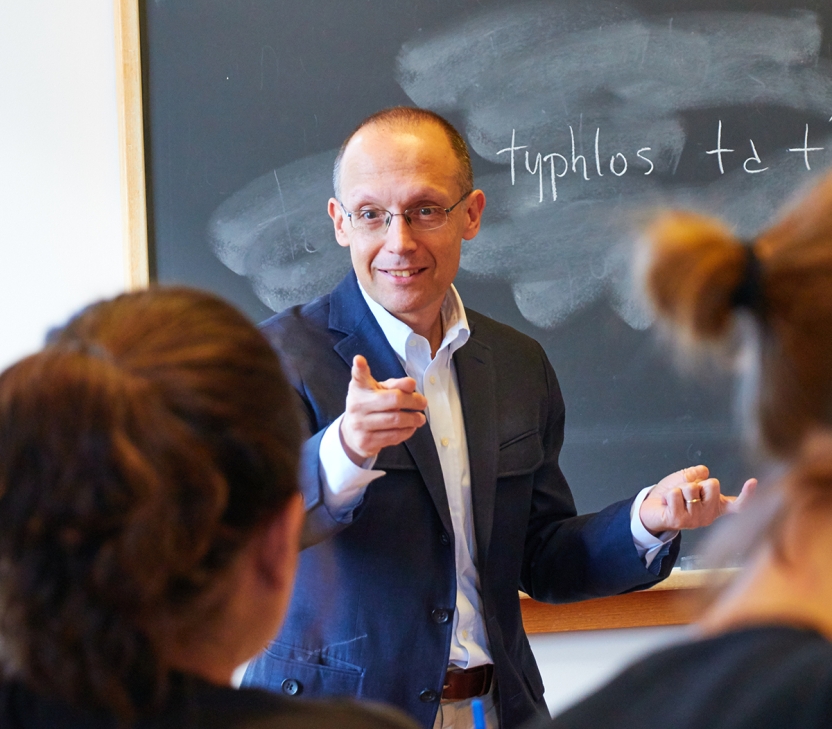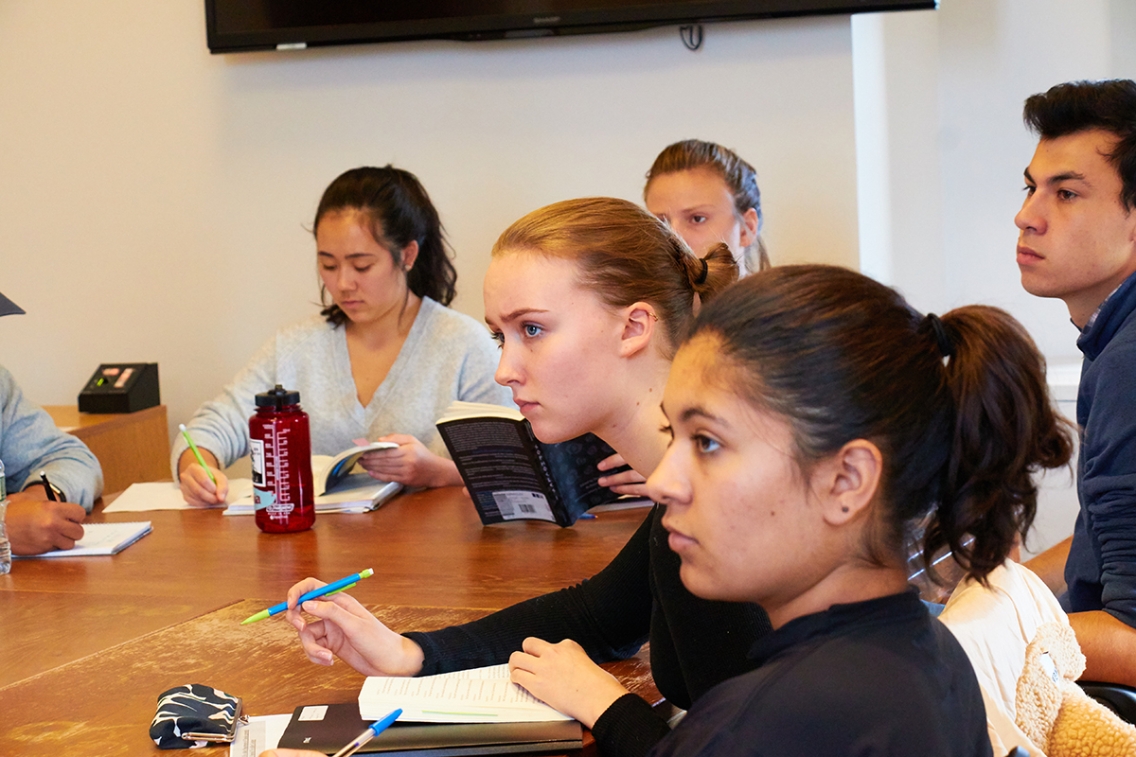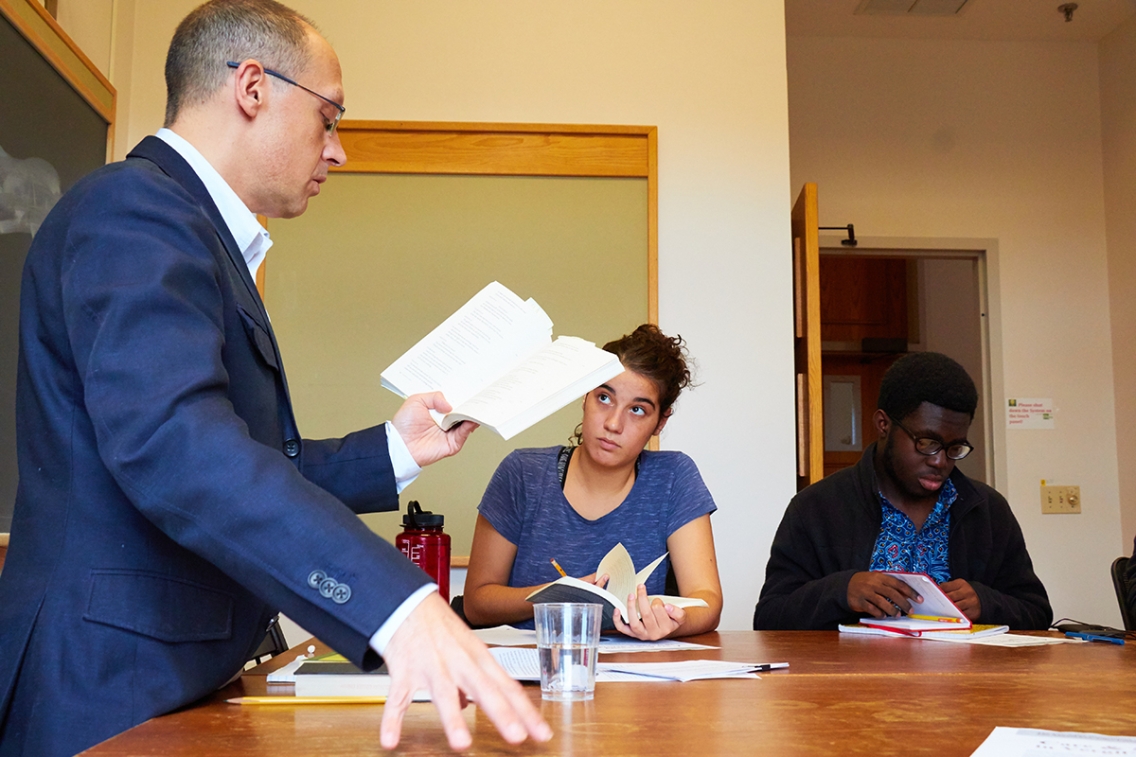First-year Seminar Digs into Sophocles

MIDDLEBURY, Vt. – Thursday afternoon, Room 305, Alexander Twilight Hall. It’s a gray October day, yet light pours in through the room’s immense west-facing windows, so high they overlook the tops of trees.
Dominating the space—a large seminar table. The room is at once so small the table and its surrounding chairs occupy almost every inch of available space, yet so high-ceilinged the mind soars for a moment before settling back to the task at hand.
At the center of today’s discussion: a woman, alone and vulnerable, confronts a man at the apex of social and political power. First in long speeches, then in rapid-fire stichomythia, their clash of wills and values rings back and forth. He argues for loyalty, law, and social order; she for her conscience and a justice beyond human knowing.
Creon condemns Antigone to die, but by play’s end his life is shattered.
“This is not a black-and-white play,” said classics professor Pavlos Sfyroeras.
For students in Sfyroeras’s first-year seminar on Sophocles and Athens, issues of human law and divine justice, of who speaks and who is silenced, of who is honored and who is excluded, the clash between individual and society, the persistent gap between our ideals and actions remain as complicated and perplexing now as they were nearly 2,500 years ago in Periclean Athens.

Students in the first-year seminar Sophocles and Athens listen to Professor Pavlos Sfyroeras during a recent class.
“The plays are so profoundly political,” said Elsa Korpi ’22, an international student from Helsinki. “Their purpose is to engage the public in some kind of dialectic. I say dialectic, not ‘debate,’ because I feel like debate is just about winning. But none of the characters are really going for the win. They’re just trying to have this dialogue to figure out what is right and what is wrong. And that’s something that modern societies could benefit from a lot—that mindset of just exploring things in public is so powerful.”
“The plays are very relatable,” said Max Padilla ’22, who plans to major in both neuroscience and philosophy and pursue a JD/MD post-graduation. “Antigone is the story of a woman breaking social barriers and doing something new, something she was told she wasn’t strong enough to do before. Even today that’s something we see, where women are trying to be represented properly; while we do have the right to vote we’re not always treated as equals in society—maybe not officially but on a subconscious level. So, I found it interesting that Sophocles, a man so long ago, spoke to that.”
“The civic side of theater is just so fascinating,” said John Vaaler ’22, who’s come to Middlebury from Minneapolis and is interested in literature. “When I check the CNN app there’s “politics,” “business,” “entertainment.” They’re all very separate. But in ancient Greek society, politics, and entertainment were synonymous. And that connection I find so interesting—just seeing how civics applies to art and vice versa.”
What Sophocles and other Greek tragedians ask of us, said Sfyroeras, is to examine ourselves ruthlessly and relentlessly. Part of the unique power of Greek tragedies: “They have a way of renewing the questions that we ask of ourselves.”
While Sfyroeras has pushed students to make contemporary connections—watching Sophie Scholl together to look at parallels between her defiance of Nazi Germany and Antigone’s defiance of Creon’s orders, reading about contemporary theater groups using Ajax to reach out to Iraq/Afghanistan veterans—the heart of the seminar is close reading. Class time often progresses line by line, with a focus on understanding key passages, analyzing how a scene relates to the play as a whole, looking at characters and their motivations, and understanding how the text works as dramatic literature.
Sometimes Sfyroeras stops to give an impromptu translation of the Greek original, highlighting a subtlety or image lost in translation.

Wanting to underscore Antigone’s “very visceral” feelings for her family, Sfyroeras turns to the play’s opening phrase, translated in the assigned text as “My sister, my Ismene.” On the chalkboard, he writes the phrase in the original Greek, then provides the far more startling literal translation: “O shared-in-common head of Ismene, head that shared (i.e., came out of) the same womb.”
“For me, it added a whole other layer,” said Emily Nagatomo ’22, an Albuquerque native who’s considering a breadth of majors, including English and psychology. “Before I thought of them as sisters like me and my little sister or anybody with their sibling. But then phrasing it like they were coming from the same womb, they were one person—it conveys a whole different bond so that when Antigone denounces Ismene and rejects her it’s all the more poignant and significant.”
The “foreignness” of classical texts is as important to Sfyroeras as the things that make them familiar and universal. Through background readings, slide lectures on Greek vases, and impromptu disquisitions on Athenian governance, philosophy, and history, Sfyroeras gets students to confront and to appreciate the many ways Sophocles’s culture is utterly unlike our own.
“This is actually especially relevant these days,” said Sfyroeras. “These texts come from a culture that in many ways is alien to us. At the same time, they are the foundational texts of who we are and of the way we speak.”
Several students, for example, noted the strangeness of a dramatic text that centers around “whether or not you can bury someone.”
But, as Sfyroeras observed, contemporary events can sometimes illuminate Greek tragedy in surprising ways. For example, after the 2013 Boston Marathon bombings, one of the brothers was killed fleeing the police. “No one, no single town in the Northeast, was willing to give this person who had done this horrific thing a burial.” Suddenly, the strangeness of the Ajax and Antigone burial debates had turned into a gut-wrenching, national issue.
Asked why he had chosen to focus on Sophocles rather than another Greek tragedian, Sfyroeras remarked: “The message of Euripides seems to be, ‘Watch out, otherwise you will be in trouble.’ The message of Sophocles seems to be, ‘It is the human condition to be in trouble already.’ In other words, there is a darkness at the heart of being a human being, and especially of being a citizen, yet this very darkness can become a source of light.”
Sfyroeras continued: “I think the most valuable thing about Sophocles is the way he forces us to ask questions. He doesn’t necessarily give answers, but every single play, I think, is asking a number of questions that we also face.
“And that’s why I consider Sophocles a good topic for a first-year seminar. These are questions that young people on the verge of citizenship should really start asking: What is our duty when we are asked to live by principles that violate our nature? Is there a self, a core of the soul, that is independent of social relationships? What role should knowledge play in a society? Are there limits to it? How are we going to define them? How are we to nurture young people into becoming reflective, politically autonomous citizens?”
Attention to this latter question infuses Sfyroeras’s work as a classics professor, as a cohead of Ross Commons, as an advisor and long-time teacher of first-year seminars. Alongside the College’s goals that first-year seminars provide a gateway to the undergraduate experience, Sfyroeras’s own goals for the class underscore his profound commitment to students and profound love of the material.
“What I want is for students to really become familiar with a body of work and to engage seriously and carefully with texts, cultural artifacts, that are at the foundation of the way we think as 21st-century individuals.
“I also want them to develop, if they haven’t already, the ability to read for pleasure and to think of these texts as sources of strength and comfort and consolation for difficult times that they will encounter later in life.
“And this has been my experience: these texts are really manuals for survival, as individuals and as communities.”
Sophocles and Athens is one of 44 first-year seminars offered this fall on a wide range of topics, from “Love and Death” to “Music and the Black Church” to “Venomous Cures.” The courses are designed to allow students to participate actively in their own learning and to begin to acquire the writing and speaking skills necessary for independent, intellectual achievement throughout college and beyond.
By Gaen Murphree; Photos by Todd Balfour

